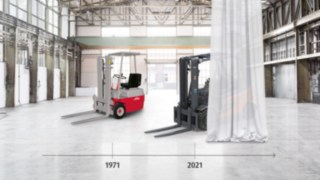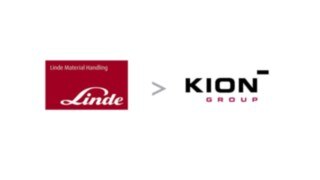
Forward-looking trucks with a 50-year success story
17 May 2021
Linde Material Handling reaches milestone with electric forklift trucks – new generation ready to be launched on the market
The German industrial trade fair held in Hanover in March 1971 saw the beginning of what has developed into a 50-year success story: Back then, Linde Material Handling (Linde MH) presented its first electric forklift truck. Ever since, the intralogistics specialist has left its mark on electric mobility with numerous technical innovations, advancing to become the European market leader in the electric counterbalance truck segment. Now the next highlight is waiting in the wings: June will see the launch of a new truck generation that combines “the best of two worlds”, thereby putting the electric forklift on par with ICE powered trucks.
“Looking back, it was a decision that set the course for the future,” says Stefan Prokosch, Senior Vice President Brand Management Linde MH. “Today, we not only offer our customers a huge portfolio of electrically powered industrial trucks with a variety of energy storage systems, but we also use our expertise to electrify vehicles of all kinds – from hackney carriages to trolley cars.”
When the first Linde-branded electrically powered forklift truck was launched in the early 1970s, the enormous potential of electric mobility was not yet foreseeable. Development was primarily aimed at offering a vehicle for indoor applications. With the battery-powered forklift, Linde MH opened a new chapter in the company’s history, as the drive and energy storage system posed different technical challenges than its flagship: the Linde hydrostat. Highlights of the first electric series in the capacity range from 1 to 1.5 tons included the dual-motor front wheel drive, which enabled turning maneuvers on the smallest possible radius, and the twin-pedal control replicated from the hydrostat. This feature was designed to make it easier for operators to switch between the two types of drive. Over the following years, the demand for electrically powered forklifts increased steadily. This was because the number of warehouses and distribution centers kept growing – and with it the need for emission-free equipment. At the same time, the demands on these low-noise and emission-free indoor trucks increased: Customers wanted higher payloads, more handling capacity and a greater number of variants to cover ever new areas of application in industry and trade.
Compact axle as a milestone in e-truck development
The further development of power electronics and digital technology paved the way for the continued success of Linde MH’s electric forklifts. In 1999, the first model featuring a three-phase or asynchronous motor was added to the product portfolio. The engineers developed dedicated power and control modules for this new drive. This made it possible to combine the advantages of greater performance with a high level of reliability and the capability to handle demanding outdoor applications. Small and maintenance-free, the two drive motors together with the lifting hydraulics and all control components could be combined into a single assembly – the compact drive axle. Conductor rails replaced long cable lines and ensured lower energy consumption in the new Linde E14 to E20 models from 2006. For the first time, the vehicles also featured an on-board charger for flexible charging at power outlets, as well as overhead tilt cylinders for greater stability of the mast. Further features were added in 2010 with the 2- to 5-ton models, including the vibration-decoupled drive axle, the automatic handbrake, the digital battery charge indicator, and a traction control system for excellent ground grip. This met the needs of many customers and contributed in no small part to Linde MH becoming the market leader for electric counterbalance trucks in Europe.

The success story of Linde Material Handling’s electric forklifts began at the German industrial trade fair in Hanover back in March 1971. The 50th anniversary coincides with the launch of a new, forward-looking generation of industrial trucks.

The success story of Linde Material Handling’s electric forklifts began at the German industrial trade fair in Hanover back in March 1971. The 50th anniversary coincides with the launch of a new, forward-looking generation of industrial trucks.
Safety, efficiency, cost-effectiveness – and full performance
In addition to higher performance and low energy consumption, ergonomics and safety were at the top of the list of requirements for every new forklift truck development. And here, too, Linde MH has repeatedly set the pace in the industry over the past 50 years. Many equipment and performance options were world firsts at the time of their respective market launches and remain unique Linde features to this day. These include, for example, the Linde Safety Pilot driver assistance system: It limits the lifting height if the permissible load capacity is exceeded and regulates the travel speed in relation to the load being transported. Another example is the Linde Roadster. This vehicle was designed without A-pillars, which improves visibility of the surroundings and ensures greater operational safety.
The use of lithium-ion technology as a new means of energy storage and the development of the fuel cell with hydrogen as an energy source have given electric forklifts further impetus over the past ten years. Even more growth is promised by a new generation of Linde forklifts to be launched in June. “With a completely new development, our electric trucks will finally catch up with the powerful IC trucks of the Linde brand,” announces Prokosch. Everyone can attend the virtual presentation of the new vehicles on June 16 at 11:00 am. “Masterpieces” is the name Linde MH has given to the approximately half-hour product display, which will not only present the advantages of the new design in a vivid and varied way, but also give the people behind the innovations the opportunity to speak about them ► Yourway.Linde-mh.com.
